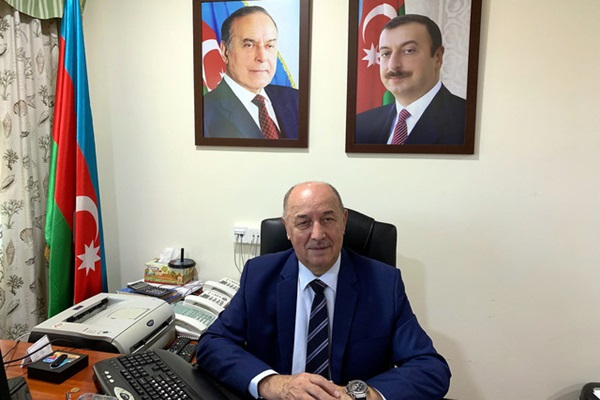By R.Ravichandran
KUALA LUMPUR, Feb 27 (NNN-BERNAMA) — Azerbaijan, where 20 per cent of its territory is still under its neighbouring Armenia’s occupation, highly appreciate Malaysia’s continued support on the issue of Nagorno-Karabakh conflict.
Azerbaijan’s Ambassador to Malaysia, Prof Dr Qaley Allahverdiyev, said that Kuala Lumpur supported the four United Nations resolutions adopted during the conflict, which, among others, reaffirmed Azerbaijan’s territorial integrity.
He said Malaysia also supported resolutions on Azerbaijan’s position in regards to the Nagorno-Karabakh conflict at other major international forums, including the Non-Aligned Movement (NAM) and the Organisation of Islamic Cooperation (OIC).
He recalled that in 2017, the Malaysia-Azerbaijan Parliamentary Friendship Group of the Parliament of Malaysia also fully supported all resolutions adopted by the UN and the OIC pertaining to the Nagorno-Karabakh conflict. Kuala Lumpur and Baku established diplomatic ties in 1993.
Allahverdiyev also said that on Feb 14, he paid a courtesy call on Dewan Rakyat Speaker Datuk Mohamad Ariff Md Yusof where the two sides expressed their satisfaction with the current level of existing cooperation and that relations between Malaysia and Azerbaijan are developing at a bilateral and multilateral level.
“Furthermore, establishing an inter-parliamentary friendship group in the newly formed Malaysian Parliament has been emphasised at the meeting,” he said.
Allahverdiyev said he expressed his gratitude to Mohamad Ariff for the fair position of Malaysia on the peaceful settlement of Armenia-Azerbaijan and Nagorno-Karabakh conflict and appreciated its continued support within international organisations.
“We are very happy with Malaysia’s support all this while…we really appreciate the support. Malaysia is our brotherly country,” he told Bernama International News Service in an interview in conjunction with the 27th anniversary of the commemoration of the Khojaly tragedy on Tuesday.
The Khojaly tragedy refers to the killing of 613 ethnic Azerbaijani civilians in February 1992 in Khojaly, a small town in the Nagorno-Karabakh region. The number included 106 women, 63 children and 70 elderly people.
Besides that, on that bloody night, Allahverdiyev said 1,275 people were taken as hostages while 150 more are still missing.
There are memorials erected in several countries like Germany, Turkey, the Netherlands, Mexico and Bosnia and Herzegovina dedicated to the victims.
Allahverdiyev said several countries have already recognised the tragedy as genocide and the Azerbaijan government is working towards gaining international acknowledegment to recognise the tragedy as genocide.
“For our country and the people, this is unprecedented brutality. We have many people still looking and searching for their missing family members. We did not and will not forget that inhuman crime,” he added.
The ambassador said more than one million Azerbaijanis became refugees and internally displaced persons due to the Armenian occupation.
He pointed out that at the 12th session of the OIC Summit in Cairo in 2013, the final communique called upon its member states to exert due efforts for the recognition of the Khojaly tragedy, adding that such recognition contribute to establishing justice, relieving pains and preventing recurrence of such crimes in any part of the world.
The conflict between the two countries started in 1988 – three years before the dissolution of the Soviet Union in 1991 – following Armenia’s territorial claims against Azerbaijan.
And in 1992, war broke out between the two former Soviet states, resulting in Armenia’s occupation of 20 per cent of Azerbaijan’s territory, including Nagorno-Karabakh and seven surrounding districts. All these areas are internationally recognised as part of Azerbaijan.
However, Armenia has yet to withdraw its armed forces until today. Due to the current occupation by Armenia, no diplomatic relations exist between the two countries.
A ceasefire was signed in 1994 but there has been an escalation of tensions from time to time. On Monday (Feb 25) the Azerbaijan Defence Ministry stated that Armenian troops have violated the ceasefire along the line of contact for 25 times throughout the day.
According to Azerbaijan, the history of persecution and oppression against the Azerbaijanis at the hands of Armenians dated back to 1828. In 1998, the national leader of Azerbaijan people Heydar Aliyev issued a decree to commemorate March 31 as the “Day of Azerbaijanis’ Genocide”, conducting a political and legal assessment of the genocidal acts committed by Armenians against Azerbaijanis at the beginning of the 20th century.
Located at the crossroads of Eastern Europe and Western Asia, Azerbaijan is a landlocked nation of about 10 million people, where 96 per cent of its population are Muslims.
When Azerbaijan declared independence from Russia in 1918 and before being incorporated into the Soviet Union in 1920, it gained the distinction of being the first democratic state in the Muslim world.
In October 1991, Azerbaijan declared its independence from the then Soviet Union.
— NNN-BERNAMA




